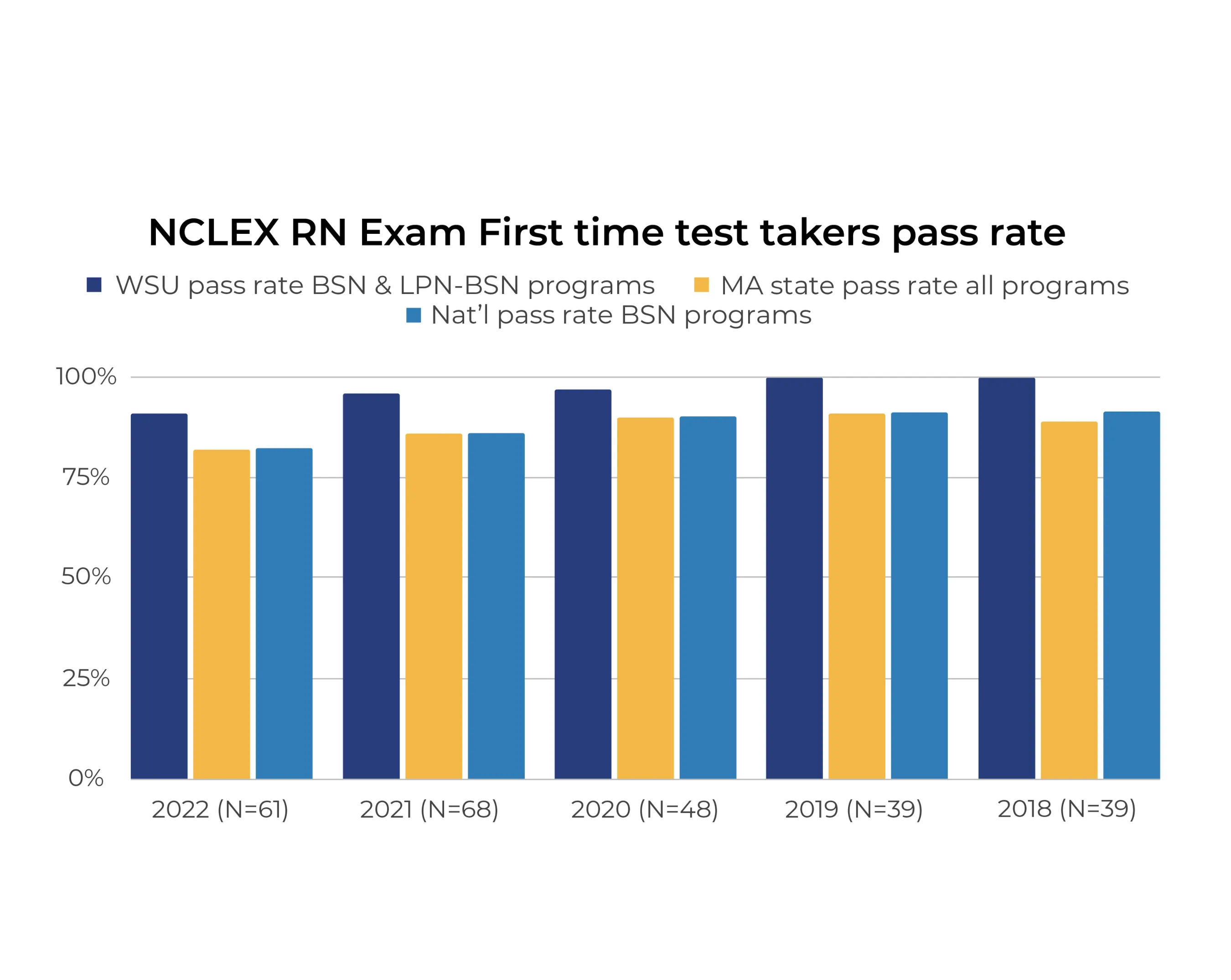Prepare for a rewarding career in nursing.
Learn how to provide the best possible health care to patients in a variety of settings.
Our Bachelor of Science in Nursing (BSN) program will prepare you for the roles and responsibilities of professional nursing. Why consider Worcester State when there are so many nursing schools? Our nursing department is accredited by the Commission on Collegiate Nursing Education and ranked #1 among the best colleges for nursing in Massachusetts by registerednursing.org. You will learn current theoretical, scientific, and research knowledge as well as organizational structures, missions, visions, philosophies, and values of various medical settings. You will also get hands-on practice in simulation rooms and laboratories and in off-site clinical settings throughout Worcester and beyond. Placements include:
- Edward M. Kennedy Community Health Centers (comprehensive community health services)
- Fairlawn Rehabilitation Hospital (rehabilitation and long-term care)
- MA Department of Mental Health Worcester Recovery Center and Hospital (mental health services and supports)
- Notre Dame Health Care Long Term Care and Rehabilitation Center (rehabilitation and long-term care)
- UMass Memorial Health – across multiple campuses, including University, Memorial, Harrington, and Clinton Campuses (acute care and specialty units)
What you will learn in this degree program
- How to exercise clinical judgment across a variety of healthcare settings
- Ability to deliver compassionate, culturally sensitive care
- Implications of and influences on social determinants of health
- Advocacy skills for individuals, families and communities
- Evidence-based practices/methods for care delivery

STUDENT STORIES
Explore Nursing and Health Sciences at Worcester State.
Requirements for Nursing
-
In compliance with policy of the Massachusetts State Board of Nursing, all applicants/students are informed that completion of the BS degree does not guarantee admittance to the registered nurse licensure examination. According to Board Licensure Policy 00-01, any individual convicted of a felony or misdemeanor conviction and/or who has been disciplined by a licensure/certification body must be evaluated by the Board to determine a licensure applicant’s compliance with the “good moral character” licensure requirement established at Massachusetts General Laws, Chapter 112, section 74 and 74A. Any individual who has been convicted of a felony or misdemeanor conviction, and/or who has been disciplined by a licensure/certification body, or whose ability to practice professional nursing is adversely affected by a physical or mental disability/illness that may endanger the health and/or safety of a person should seek special advising prior to enrolling in any professional nursing program in Massachusetts. Individuals convicted of certain criminal convictions are permanently excluded from nurse licensure in Massachusetts.
All students in the nursing program will be required to have periodic Criminal Offender Record Information (CORI) checks requested by the department and/or clinical agencies. This background check is a computerized search to determine if an individual has any convictions, outstanding warrants or pending complaints. The information from these records is confidential and is destroyed when students graduate. Progression and mandatory clinical placements in the nursing program are contingent on a “no report” CORI check result. Clinical agencies may independently perform CORI checks on students and are not required to accept a student with a CORI report indicating that an offense exists. The department is not responsible for alternate clinical placements for students who cannot be placed in an agency related to a CORI offense report. Students have an obligation to inform the department chair if any legal issues arise while in the program that are reportable on a CORI. Read more.
- Nursing students will be placed in a variety of health care settings. Each agency has requirements, which students must fulfill before they are allowed placement. This list may include, but is not limited to, the following; physical exam, immunizations, agency specific orientation, CORI, SORI, and drug screening. Progression and mandatory clinical placements in the nursing program are contingent on meeting all agency requirements. If a student is denied placement by an agency for any reason, including a positive drug or CORI report, the nursing department is not responsible for providing alternate clinical placements.
-
All newly admitted students will be required to participate in an online documentation tracking system and provide the documentation listed below. Students are required to maintain compliance (updated documentation) for the entirety of the program. Information for accessing the online documentation tracking system will be provided by the clinical resource coordinator. Requirements that must be electronically submitted include:
- Current, unencumbered license to practice as a Registered Nurse in the Commonwealth of MA.
- CPR: American Heart Association BLS for Health Care Provider or the American Red Cross CPR for the Professional Rescuer are the only accepted certifications
- Health Information Disclosure Form
- Proof of Health Insurance
- Physical Exam
- Hepatitis B Immunization Series & positive titer
- MMR (Measles, Mumps and Rubella) Documentation of 2 doses or positive titers for each
- Varicella (documentation of 2 doses or positive titer, history of disease is not accepted
- TuberculosisA. All students with no past history of a positive Tuberculosis (TB) screening test must provide documentation of annual TB screening. Any student with a TB screening that is greater than 12 months old must provide baseline TB screening through IRGA (Interferon Gamma Release Assay) or a 2 -step TST (tuberculin Skin Test)
B. Students who have been vaccinated with BCG (Bacillus Calmette-Guerin) and are accustomed to obtaining chest x-rays are required to have a baseline TB screening. BCG is no longer considered to be a protective measure against TB or a contradiction to TB screening. Should the result be positive, a chest x-ray and a doctor’s note is required to rule out active disease
10. Tdap (Tetanus/Diphtheria/Pertussis) vaccine, if it has been 5 years or more since the last dose of Td
11. Flu Vaccine for current flu season or signed declaration (medical exclusion only)
Please note that Clinical facilities may stipulate additional requirements for which documentation must be provided. Also, many of these requirements need to be updated annually or biannually. It is students’ responsibility to submit updated records.
- Criminal Offender Record Investigation (CORI) is required for all students
- Sexual Offender Record Investigation (SORI) and/or drug screening may be required by health care agencies
- Professional liability insurance is renewed annually provided by Worcester State University
Student Organizations in Nursing
- This student led organization is actively involved in outreach leadership development. Membership is mandatory for matriculated students in Track I and Track III programs.
- The International Honor Society for Nurses provides leadership and scholarship in practice, education, and research to enhance the health of all people. Students are selected for membership into the local chapter of the Iota Phi Chapter-at-Large based on academic and personal criteria.
Take the next step towards a Nursing degree
Explore sample courses in the Nursing Major. -
-
-
-
-
-
-
NU-200 Introduction to Professional Nursing I
NU-206 Principles of Pathophysiology and Pharmacology I
NU-309 Nursing Science I: Obstetrics
NU-310 Nursing Science I: Medical-Surgical Nursing
NU-340 Nursing Science II: Pediatrics
NU-441 Nursing Science III: Mental Health Nursing
NU-450 Leadership in Nursing
Prerequisites and required courses for Nursing Major
Meet the Nursing Faculty

William Chadbourne
Professor William Chadbourne has a Master's degree in Community/Public Health and a Post-Graduate Certificate in Nursing Education. His specialty is Mental Health and worked in the mental health field for over 30 years. Professor Chadbourne has [...]

Pamela Harris
Professor Pamela Harris boasts education from a RN diploma school of nursing at Massachusetts General Hospital, and brings extensive experience gained from Assumption College, Worcester State University Masters in Nursing, and is a current full time [...]

Carol McLaughlin
Professor Carol McLaughlin joined Worcester State University in 2011 as an adjunct faculty member for Med/Surg clinical and joined Worcester State University as full time faculty in 2021. She has numerous years of nursing experience with extensive [...]
Julia McNeil
Professor Julia A. McNeil, PhD(c), MSN/Ed, RN, began her journey in nursing at Austin Peay State University, where she received her Bachelor's Degree of Science in Nursing in 2007. She completed her MSN at the University of Phoenix in 2010. During [...]
Estimated Nursing Salaries
According to the U.S. Bureau of Labor Statistics, as of 2023, the median annual salary for all registered nurses (RNs) was $86,070. However, those with a registration in nursing and a Bachelors in Nursing can often expect to earn more than the average salary. According to ZipRecruiter, the average salary for an RN with a BSN degree is more than $90,000.
Careers In Nursing
-
Registered nurses provide and coordinate patient care, educate patients and their families about health conditions, and provide emotional support. They work in various healthcare settings, including hospitals, clinics, nursing homes, schools, and home healthcare agencies. Our BSN degree provides the education often required for leadership and management positions, specialized nursing roles, and public health jobs and the qualifications typically required for positions in research, consulting, and teaching. The degree provides a foundation for further education, such as a Master of Science in Nursing (MSN) or Doctor of Nursing Practice (DNP).
-
Nurse practitioners are advanced practice registered nurses who assess, diagnose, and treat patients, including prescribing medications, ordering tests, and providing primary and specialty care. They may specialize in areas such as family practice, pediatrics, geriatrics, psychiatric-mental health, or women’s health.
* Further education required.
-
Nurse anesthetists are advanced practice registered nurses who administer anesthesia and monitor patients before, during, and after surgical procedures. They work closely with surgeons, anesthesiologists, and other healthcare professionals to ensure patient safety and comfort in surgical settings.
* Further education required.
-
Nurse educators teach and train future nurses in academic settings such as colleges, universities, vocational schools, and healthcare facilities. They develop curriculum, facilitate lectures and clinical rotations, and mentor students to help them develop the knowledge and skills needed to become competent nurses. Worcester State offers a Post-Master’s Certificate for Nursing Education.
* Further education required.
-
Nurse case managers coordinate healthcare services and resources for patients with complex medical needs, chronic illnesses, or disabilities. They assess patients’ needs, develop care plans, collaborate with healthcare providers and insurance companies, and advocate for patients to ensure they receive appropriate care and support. Nurse case managers often work in hospitals, insurance companies, rehabilitation centers, or home healthcare agencies.
* Further education required.
-
A population/public health nurse (PHN) focuses on the health and well-being of entire populations or communities, rather than individual patients. These nurses work to promote and protect the health of populations through various means, including disease prevention, health education, policy advocacy, and community organization. Worcester State offers a Post-Master’s Certificate in Public & Population Health Nursing.
* Further education required.
Recent News from the Nursing Department
Nursing Students Get Real-world Experience at Free Clinic
Social Media for Nursing at Worcester State






